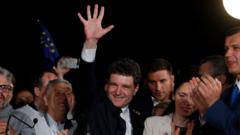Following the election of Nicusor Dan as Romania's new president, the nation finds itself at a crossroads, caught between a yearning for renewal and the persistence of political divisions. His victory over nationalist contender George Simion reflects urban frustrations and desires for European alignment, yet significant obstacles await in this transformative journey.
Romania's New Era: Nicky Dan's Presidency Marks a Shift from Division to Hope

Romania's New Era: Nicky Dan's Presidency Marks a Shift from Division to Hope
The election of Nicusor "Nicky" Dan signals a desire for change in Romania, but challenges loom ahead as the country grapples with internal divisions.
In a remarkable shift for the Romanian political landscape, the newly-elected president, Nicusor Dan, often affectionately referred to as "Nicky," emerges from relative obscurity to fill the role previously held by figures from Romania's longstanding political establishment. Dan, who has served as mayor of Bucharest since 2020, represents a reaction against the old guard that has dominated the country's political scene for over thirty years.
His recent election victory came as a surprise to many, considering his opponent was George Simion, a hardline nationalist known for incendiary rhetoric and Euroscepticism. In the first round of voting, Simion led with 41% support but ultimately lost in the runoff as Dan gained momentum. Political analysts attribute this turnaround to an increased voter turnout, driven by a mix of fear of regression and the desire for progressive change among urban voters.
While Simion's campaign relied heavily on nationalist themes, his polarizing comments and controversial behavior turned off potential supporters. Observers noted missteps, such as a video in which Simion insulted French President Macron, causing concerned voters like Diana to reevaluate their choices. Conversely, Dan’s supporters rallied around a pro-European stance, emphasizing aspirations for a future aligned with European norms and values.
Despite Dan's emphatic victory, the divided sentiment among the populace presents a formidable challenge. Many voters still resonate with Simion's promise of empowerment for the working class and "traditional values." As these contrasting visions vie for dominance, the newly elected president faces the daunting task of moderating expectations and uniting a fragmented political landscape.
The election also reveals deeper undercurrents, such as widespread frustration with Russia’s influence in Romania, which may have further galvanized support for Dan as a candidate perceived to stand against external meddling.
Looking ahead, Dan's ability to navigate these complexities will determine not only his own political future but also that of Romania's trajectory within the European context. As supporters celebrated last night, waving EU flags with renewed hope, the challenges ahead are clear: bridging the divide, addressing deep-rooted grievances, and affirmatively positioning Romania as a stable, progressive force within Europe. How Dan responds to these expectations will be pivotal in shaping whether this moment marks a true turning point for Romania or merely a temporary reprieve from the ongoing struggles that define its political landscape.





















